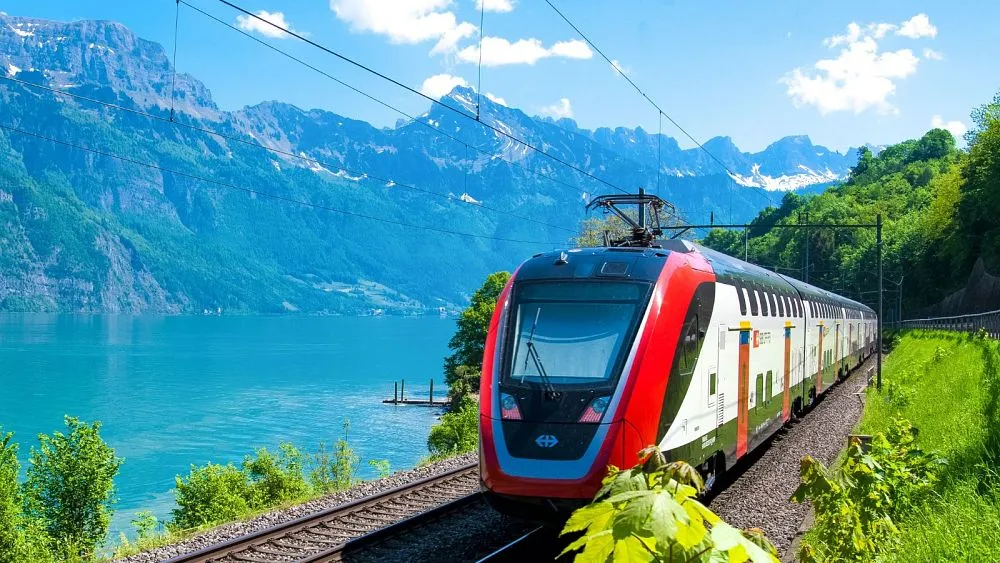This is the best summary I could come up with:
France will increase taxes on flights to invest more in its railways, the country’s Transport Minister Clément Beaune announced this week.
Last month Greenpeace released an analysis showing that taking a train is on average double the cost of flying.
The report compared the costs of flight and train tickets on 112 routes in Europe, including 94 cross-border connections.
Dardenne counters that the climate crisis is a much bigger threat to tourism and points to the example of wildfires and heatwaves in Europe this summer that have been disrupting holidays on the continent.
The European Commission has been working on an upcoming ‘Regulation on Multimodal Digital Mobility Services’ to improve the process of booking tickets across rail, bus and air.
It says this could be funded by windfall profit taxes, the phase-out of airline subsidies, and a fair taxation system based on CO2 emissions.
I’m a bot and I’m open source!
Tax subsidies on avation gas? Where as none on trains (subsidies)
no taxes on aviation fuel and no VAT on flights. Both apply for trains.
So it’s the fault of the governments? What a surprise. /S
Why guessing, when the answer is in the article?
Suggesting that someone read the article in a comment section under said article…blasphemy!
maybe don’t use a Picture of the SBB, probably the best Train Operator on the entire Continent, for this Article?
anyways, i just compared SBB Zürich -> Généve: 48.- / 44.20 CHF. not even comparing the zone subscriptions you can use to save money if you frequent a route.
Airplane Zürich -> Généve: min. 94.- CHFfor any other country it probably holds up though
If you go international that stops pretty quickly thou. Berlin - Zürich is something 226€. A flight costs 209€. The issue is no kerosine tax and no VAT. German VAT on that alone would raise costs to 249€.
Why was the vat removed for flights?
For international flights, but in Europe that is nearly all of them. The idea in general with vat is that is paid for every consumption within the country. However it being international, it is no longer domestic so it does not apply. For trains it ends up being domestic travel in one country and then the other, so vat applies.
You can’t use zone subscriptions on most IC connections and 48.- is also only with a half-fare subscription. So basically equal price.
Without proper info and data we are swimming in opinions and anecdotes and not able to vote for something rational.
Tax exemptions for aviation is a problem. A bigger problem yet is that the environmental costs are not charged to the user (in both aviation or trains).
But even considering that, I suspect the train tickets would still be to expensive, relative to aviation. And that is, in my opinion, due to the inherent lack of competition in trains and relatively easy to implement competition in aviation. Train and train infrastructure companies need more accountability — big vehicles in dedicated tracks should result in very inexpensive tickets, why aren’t they?
It’s faster and cheaper than trains
It’s faster
Apart from long distances, that’s true only if you count flight time. To take a plane, you need to drive to the airport (which is far from the city), show up at least 2 hours before your flight, go through check-in, wait in line and do the reverse on arrival; and if there’s a sudden storm or something you gotta wait on the runway for another 3 hours. Trains take you from one city center to another city centre, you need to show up 20 minutes before departure and there’s no check-in (unless you live in Canada).
and cheaper
Artificially cheaper, planes are subsidized, trains are not. When you buy a plane ticket, you’re actually paying for only a fraction of the real price.
Show up 20min before? More like 2min before :)
You like to live dangerously…
Haha why? What countries does that not work in? The only time I had to be earlier on a train than its departure was on the Eurostar
I assume you’re not in the EU…
Technically not, but I traveled a lot by train in Europe
Most commonly you want to go from city center to city center. Airports are outside, so you have to get there. that takes time. Then you have security checks, boarding and so forth, which takes hours. If trains are reasonably fast trains are faster at something like 500km, for really well built high speed rail you end up at 1000km.
As for cost, as the article explains, trains have to pay fuel taxes and VAT, which flights do not. The price difference is low enough, that that would make trains cheaper or at least as expensive as planes on many journeys.
Oh, so the reason why flights are cheaper is because they’re cheaper? Yeah that makes sense.
🤡
Because trains require far more infrastructure
Air traffic uses far more infrastructure: airports are gigantic compared to the throughput they have. LAX has 30 M passengers per year. Berlin main station has 50 M long distance and 85 M public transport passengers per year.
„But you need rails and shit for trains!“. Yeah, and you know what, trains use way less fuel because of that… Now guess what is exempted from tax? Kerosene.
And airports still need train infrastructure or roads to be able to access them, while a train drops you right in the city.
Edit: had a look at „driftking‘s“ posting history, of course it’s just a right wing troll who’s looking forward to „getting to that sweet oil under Antarctica once the ice is gone“, lol.
so many unwrinkled brains around. i gave up on advocating for this: most of the time i am just met with deaf ears. 13€ from Netherlands to Italy: thats how facking subsidized that shit is
That sounds like a low end of reasonable price for a train ticket. I assume it’s a plane ticket though, at which point what in the actual hell that’s a subsidization level on par with driving in America
it is a plane ticket.but at least u earn a seat in a flying tube, and save alot on time travel. yea, a lot of taxpayer money is wasted in useless and polluting projects: nato funding, SLS launcher and other aerospace failing projects, bailing bankers and monopolies, so on and so forth…
I’m shocked busses lose out to cars. Also is there a difference between a bus and a coach? We don’t have coaches in America and I just thought it was British for bus
I admit not having read the full study that lead to that graph, but I think I do understand the graph itself:
Buses are local public transport (intracity), commonly run by the government/municipality/etc. They run no matter what. Maybe at some point they will abandon the line, but it is a public service, so they won’t be doing that easily.
Coaches are long distance (intercity) travel, usually run by a private company, and if it’s not profitable they’ll just cull it. You have that in the US, it’s the Greyhound, which is now run by Flixbus.
If you look at the graph, buses do not generally lose out to cars, only to cars with 4 people on it.
Now a bus that runs 24/7 has a lower average utilization, because e.g. at night you might be the only passenger. If you compare that to a fully loaded car, sure, the car is better.
And the long distance bus (coach) doesn’t have to stop every 500m, so you’ll have way less fuel spent on braking and accelerating compared to a bus.
It’s actually impressive that despite the many times a public transport bus runs at low utilization it still is better than a car with just one person on it.
A coach, on the other hand, will have a better average utilization, since they will just immediately shut it down if there’s only one person using it.
I think coaches refers to longer distance bus-travel… like greyhounds in the US.
The reason regular bus travel is so bad in that graphic is that it is counted per passenger and these inner-city buses drive a lot of the time with few passengers. But if you want to keep servicing out-laying districts and non-rush hours there is little to do about that (although often these buses are over-sized).
You cant just go and compare europe and america to the whole world. Have you ever seen South East Asian train networks? I know the article is related to the former but I think having a global perspective on this is way more important. Many places need to be accessible by plane. Global travel is not practical by train
Your point was that air travel uses less infrastructure.
And of course I can point to a high throughput airport and to a high throughput train station and conclude that the airport is using way more infrastructure in comparison.
Also nobody asked for „global travel“ by train.
And what about the SE Asian train network? Do you mean China, lol? Why must „many places“ be accessible by
trainedit: plane? This is not an argument.And your point still does not support that trains are more expensive on long disances without being subsidised by tax money. Short distance train travel is not the problem. We need long distance air travel. Who do you think occupies the economy seats. Its not the fat cats
China, japan etc
The question was: „Why are planes cheaper than trains in Europe?“
Your answer was: „because infra“.
I showed you this is wrong because you underestimate the infra needs of air traffic and also neglect the long term savings.
Because that’s why you install infra: it saves money in the long run.
Nobody – except you – is talking about „global air traffic“. Nobody.
So, if you want to burn straw men apply for a job as a fire fighter, and if you want to be a professional goal post mover, IDK, call FIFA maybe?
But stop pulling out „arguments“ out of your ass. Thank you.
Don’t get so worked up
fuck off, troll.
true point: planes should be used only for intercontinental travel: for exemple dedicate 2-3 airport hubs in all europe, and the rest of it should only be accessed by train. look up european sky on flightradar: it is always rush hour up there, and probably not so many intercontinental flights. Air travel should also be limited cross country only in Asia’s case: and the number of flight hubs should be reduced to a minimum and leave the rest of the country to be accessed through train
Literally read the article
Ignore the troll.
No
They would be cheaper, if flights had to pay VAT and taxes on fuel. The price difference is not that crazy.
deleted by creator






